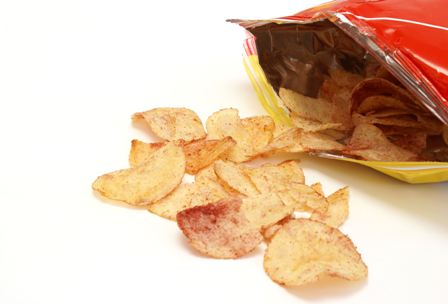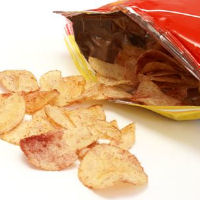A study by the University of Liverpool has found that celebrity endorsement of a food product encourages children to eat more of the endorsed product. It also found that children were prompted to eat more of the endorsed product when they saw the celebrity on TV in a different context.
Celebrity endorsement is an effective method of creating value, recognition and credibility for a brand, and celebrities are frequently used in television advertising to induce children to try foods. An example of this is former England international soccer player Gary Lineker, now principally a TV sports presenter, who has been endorsing Walker’s Crisps since 1995.
The study involved 181 children, aged between 8 and 11 years old, who were asked to watch one of three different adverts or general TV footage (Match of the Day featuring Gary Lineker as the main presenter) embedded within a 20-minute cartoon. The adverts were for Walkers crisps (featuring Gary Lineker as a celebrity endorser), a different snack food or a toy product.
The children were offered two bowls of crisps to eat, one labelled `Walkers’ and one labelled `Supermarket’ although both bowls actually contained Walkers crisps. The amount of crisps consumed from each bowl by each child was then measured.
Gary Lineker
The study found that although both bowls contained Walkers crisps, after watching the Gary Lineker advert or the general TV footage of Gary Lineker, the children ate considerably more of the Walkers crisps than the children who watched the other snack food advert or the toy advert.
Dr Emma Boyland, from the Institute of Psychology, Health and Society who led the research, said: “This is the first study to show the powerful effects of celebrity endorsement – in both a TV advertising and a non-food context – on the choice and intake of the endorsed snack product over the same product offered as a non-branded snack item.
“The study demonstrated, for the first time, that the influence of the celebrity extended even further than expected and prompted the children to eat the endorsed product even when they saw the celebrity outside of any actual promotion for the brand. It quantifies the significant influence that the celebrity has over children’s brand preferences and actual consumption.
Celebrity endorsement
“This research has consequences for the use of celebrities, and in particular sports stars, in advertising unhealthy or High Fat Salt and Sugar (HFSS) products. If celebrity endorsement of HFSS products continues and their appearance in other contexts prompts unhealthy food intake then this would mean that the more prominent the celebrity the more detrimental the effects on children’s diets.”
The research is published in The Journal of Pediatrics


I think we need to be careful about claims (ref: press release) that this study singles out the effects of celebrity – it doesn’t.
This experiment shows an ad for Walkers (under peculiar conditions) apparently increasing consumption of a Walkers product. The fact of the ad including a celebrity is incidental.
To prove that assertion would not the right control be an ad for the same product – one with celebrity, one without?
Even then, the impact may be driven by general appeal, not celebrity. So you’d need to two similar ad executions – one with, one without.
If the effects then remained the claim that “endorsment encourages children to eat junk food” would need to acknowledge the context i.e. when children are given unlimited access to crisps and told that they can eat as much as they want…
So what have we learned?
– that giving children unlimited access to crisps is probably a bad idea
– that they prefer Walkers to own-brand and that those preferences are more marked when shown an ad reminding them that Walkers are great crisps
This is not a dig at the research. But it is a dig at an irresponsible piece of PR. If the press release were an ad, I fear it would fail a complaint to the ASA.
I think it also shows that a bit more conversation between marketers and academics would go a long way in the design of these studies…
“More research needs to be done to investigate whether or not celebrity endorsement could encourage children to consume healthier items,”
There are real-life examples – McDonald’s uses its film licensing deals to make fruit, vegetable and milk options in Happy Meals more appealing to kids (so Donkey Carrot sticks; Puss in Boots milks etc) and have seen (if memory serves) a 15-20% shift towards these products.
Thanks for your interest!
The other snack food advert was for a branded nut snack (‘Nobby’s Nuts’). Our finding that the children did not consume significantly more of the branded product than the nonbranded product in the control, nonfood commercial condition suggests a lack of preexisting bias toward the Walker’s brand.
No, it is a limitation of the study (stated as such in the full article) that we did not assess whether or not the children thought that the flavour of the ‘two’ products was the same.
More research needs to be done to investigate whether or not celebrity endorsement could encourage children to consume healthier items, but this research suggests that certainly there is potential for such endorsers to affect their intake. You may already be aware of this but if you haven’t seen it, http://www.fastcompany.com/1739774/how-carrots-became-new-junk-food is a really fascinating story about how lessons learned from ‘junk’ food marketing can inform efforts to increase fruit and vegetable consumption in children, it may be that celebrity endorsement is another tool to add to this?
I am interested in the wider influences of product labelling on children.
This is an interesting piece of research.
I wondered how you controlled for the influence of the “Brand” name vs “unknown” supermarket. i.e. how much of the consumption was because of the endorsement and how much was because of a familiar and potentially liked brand name? Was the other snack food advert for a “supermarket” snack?
I see that the products offered were identical – did you assess whether the children thought they were the same flavour etc or whether the branding changed their perceptions and thus potentially their choices?
Do you believe that celebrity endorsement would work for foods we do want children to eat, even if not something they might choose?
Each group was ‘tested’ within an hour of having had their typical school lunch.
I manage an advertising industry network with a specific interest in this debate.
How did the experiment control for the most obvious influencer – how hungry the children were (or how long it had been since they had last eaten) before conducting each scenario?